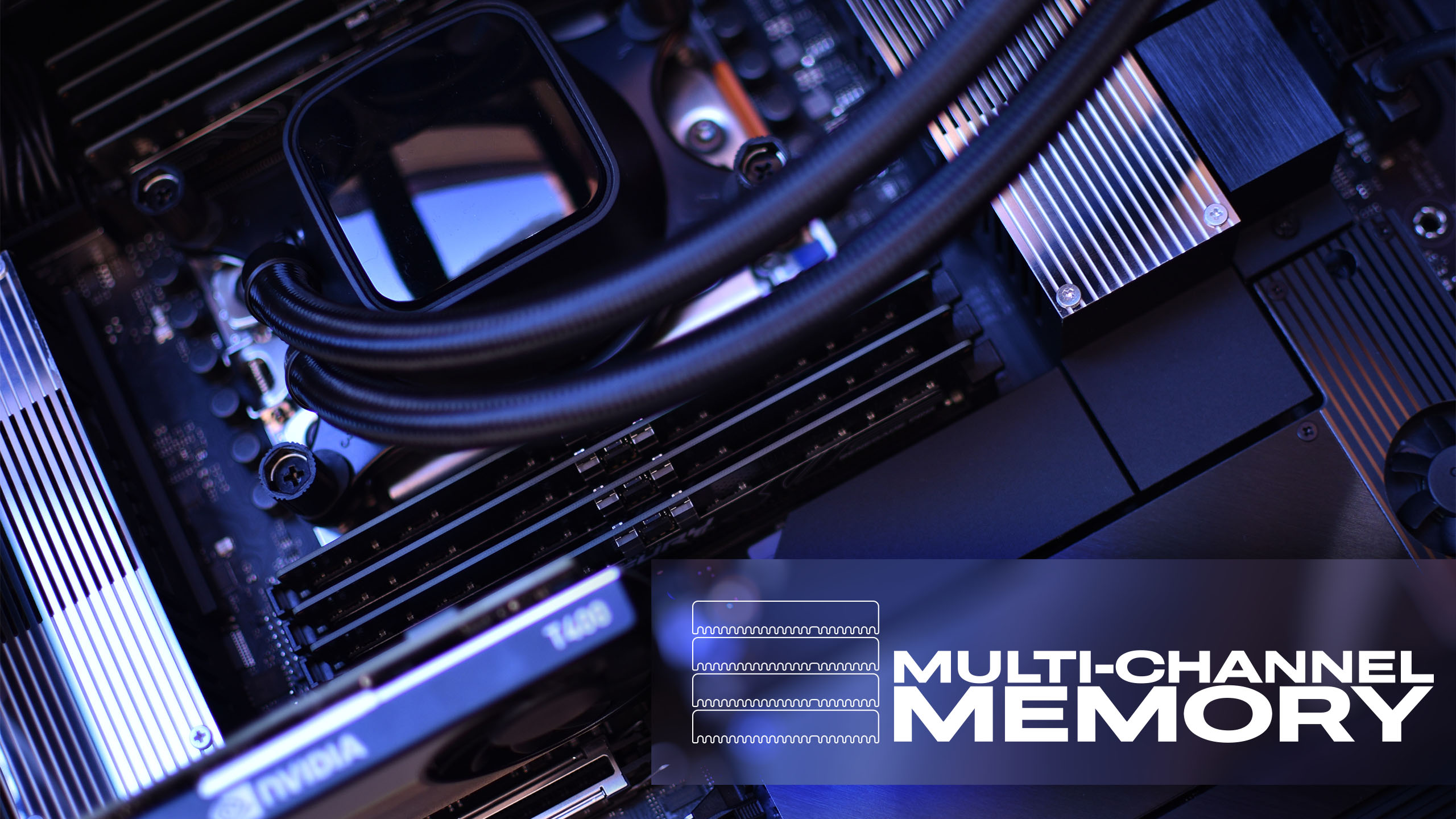In the ever-evolving landscape of computer hardware, the quest for enhanced performance is a relentless pursuit. One key component that plays a pivotal role in boosting system speed and responsiveness is multi-channel memory. By harnessing the power of dual, quad, 8, or 12 channel memory configurations, users can unlock significant performance gains tailored to their specific needs. In this article, we delve into the advantages of each configuration and highlight the scenarios where they excel. And since specific chipsets support specific numbers of memory channels, it’s important to select a PC configuration that supports your required memory channels.
Dual-Channel Memory: Doubling the Bandwidth
Dual-channel memory, as the name suggests, utilizes two memory channels to simultaneously access data, effectively doubling the memory bandwidth compared to a single-channel configuration. This enhanced bandwidth translates to faster data transfer rates, reduced latency, and improved overall system responsiveness.
Dual-channel memory is particularly beneficial for tasks that require rapid data access and transfer, such as gaming, multimedia editing, and multitasking. Gamers, in particular, can experience smoother gameplay and faster loading times, while content creators can enjoy quicker rendering and encoding processes.
Most consumer oriented processors like Intel Core i7 14700k or AMD Ryzen 9 7900X support dual channel. You can find those processor options in our Raptor Z95.
Quad-Channel Memory: Quadrupling the Performance
Quad-channel memory takes the concept of dual-channel a step further by employing four memory channels. This configuration quadruples the memory bandwidth compared to single-channel setups, delivering even higher levels of performance and efficiency.
Applications that involve heavy data processing, such as 3D rendering, scientific simulations, and professional video editing, stand to gain the most from quad-channel memory. These tasks often demand vast amounts of memory bandwidth to handle large datasets and complex computations, making quad-channel memory an ideal choice for professionals seeking optimal productivity and workflow efficiency.
HEDT designed chipsets like Threadripper TRX50 support quad channel RAM (but only when four DIMMs are populated – that’s how it works!).
8 and 12 Channel Memory: Unleashing Extreme Performance
For users with the most demanding workloads and applications, 8 and 12 channel memory configurations offer unparalleled levels of performance. These configurations provide massive amounts of memory bandwidth, enabling lightning-fast data access and processing capabilities.
Industries such as high-performance computing (HPC), artificial intelligence (AI), and data analytics rely on 8 and 12 channel memory setups to power through intensive computational tasks with ease. From scientific research to financial modeling, these configurations empower professionals to tackle the most complex challenges efficiently and effectively.
8 and 12 Channel Memory is generally relegated to the highest end workstations and servers. AMD Epyc, like our HD360, supports 12 channel RAM while Threadripper Pro and Intel Xeon run 8 channel.
Choosing the Right Multi-Channel Memory Configuration
When considering multi-channel memory configurations, it’s essential to assess your specific computing needs and workload requirements. For mainstream users, dual-channel memory offers a compelling balance of performance and affordability, making it suitable for everyday computing tasks and casual gaming.
For power users and professionals working with resource-intensive applications, quad-channel memory provides a significant performance boost, enhancing productivity and reducing workflow bottlenecks.
Meanwhile, 8 and 12 channel memory configurations cater to the most demanding computational workloads, offering unparalleled performance for specialized tasks in fields such as scientific research, engineering, and data analysis.
Multi-channel memory configurations represent a cornerstone of modern computing, offering a scalable solution to meet a diverse range of performance requirements. By harnessing the power of dual, quad, 8, or 12 channel memory, users can unlock enhanced system speed, responsiveness, and productivity tailored to their specific needs and preferences.
Optimizing your system with the right multi-channel memory configuration can make all the difference in achieving peak performance and maximizing your computing experience. Whether you’re a casual user, a passionate gamer, or a seasoned professional, Velocity Micro can create a system for you that takes advantage of multi-channel memory – and so much more.
This content was written by the expert Velocity Micro staff.



